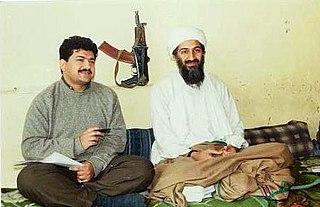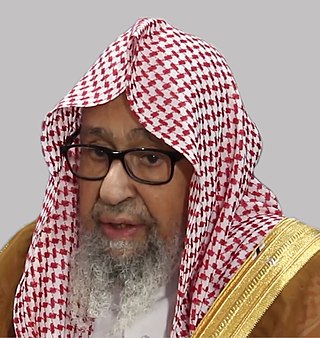Related Research Articles
Qutbism is an exonym that refers to the beliefs and ideology of Sayyid Qutb, a leading Islamist revolutionary of the Muslim Brotherhood who was executed by the Egyptian government in 1966. Influenced by the doctrines of earlier Islamists like Hasan al-Banna and Maududi, Qutbism advocates armed Jihad to establish Islamic government, in addition to promoting offensive Jihad.
Abdullah Ibn Humaid (1908–1981) also known as Abdullah bin Muhammad bin Humaid was the Chief Justice of Saudi Arabia and Imam of the Great Mosque of Mecca. He was succeeded as Great Mosque imam by his son Salih bin Abdullah al Humaid.

Imam Mohammad Ibn Saud Islamic University (IMSIU) (Arabic: جامعة الإمام محمد بن سعود الإسلامية), commonly known as Al-Imam University, is a public university in the sub-municipality of Shemal in Riyadh, Saudi Arabia. It was founded in 1950 as an Islamic seminary by Muhammad ibn Ibrahim ash-Sheikh, the first Grand Mufti of Saudi Arabia. It was renamed the College of Sharia in 1953, before becoming a full-fledged university through amalgamations of other colleges and assuming its current name in 1974. The university also has overseas presence in Indonesia and Djibouti.
Hamoud al-Aqla, commonly known as al-Shu'aybi was a Saudi-born Islamic scholar.
The Saudi Arabian textbook controversy refers to criticism of the content of school textbooks in Saudi Arabia following the September 11 attacks.
Muhammad Muhsin Khan was an Islamic scholar and translator of Afghan origin, who lived in Madinah and served as the Chief of Department of Chest Diseases at the King Faisal Specialist Hospital and Research Center. He translated both the Quran and Sahih Al-Bukhari into English. He was the director of the clinic of Islamic University of Madinah.

Islamic extremism, Islamist extremism or radical Islam refers a set of extremist beliefs, behaviors and ideology within Islam. These terms remain contentious, encompassing a spectrum of definitions, ranging from academic interpretations to the notion that all ideologies other than Islam have failed and are inferior. Furthermore, these terms may extend to encompass other sects of Islam that do not share such extremist views.
America at a Crossroads is a documentary miniseries concerning the issues facing the United States as related to the War on Terrorism. It originally aired on PBS.
Rabīʿ bin Hādī ʿUmayr al Madkhalī is a Saudi professor who is a former head of the Sunnah Studies Department at the Islamic University of Madinah. He is a Salafi Muslim scholar who is considered to be one of Salafism's prominent thinkers.

Osama bin Laden took ideological guidance from prominent militant Islamist scholars and ideologues from the classical to contemporary eras, such as Ibn Taymiyya, Ibn al-Qayyim al-Jawziyyah, Sayyid Qutb and Abdullah Azzam. During his middle and high school years, bin Laden was educated in Al-Thager Model School, a public school in Jeddah run by Islamist exiles of the Muslim Brotherhood; during which he was immensely influenced by pan-Islamist ideals and displayed strict religious commitment. As a teenager, bin Laden attended and led Muslim Brotherhood-run "Awakening" camps held on desert outskirts that intended to raise the youth in religious values, instil martial spirit and sought spiritual seclusion from "the corruptions" of modernity and rapidly urbanising society of the 1970s in Saudi Arabia.
Muhammad Taqi-ud-Din bin Abdil-Qadir Al-Hilali was a 20th-century Moroccan Salafi, most notable for his English translations of Sahih Bukhari and, along with Muhammad Muhsin Khan, the Qur'an, entitled The Noble Qur'an.

Saleh Al-Fawzan is an Islamic scholar and has been a member of several high religious bodies in Saudi Arabia. He is considered to be the most senior scholar of Islam in Saudi Arabia.
Abd Al-Aziz Fawzan Al-Fawzan is an Islamic scholar and author in Saudi Arabia. He is also known as Abd al-Aziz b. Fawzan al-Fawzan, Abd Al-Aziz Al-Fawzan.

Salafi jihadism, also known as Revolutionary Salafism or jihadist-Salafism, is a religious-political Sunni Islamist ideology, seeking to establish a global caliphate, characterized by the advocacy of "physical" (military) jihadist attacks on non-Muslim and (takfired) Muslim targets, and the Salafist interpretation of sacred Islamic texts, which they believe to be "in their most literal, traditional sense", to bring about the return to "true Islam".
Institute of Islamic and Arabic Sciences in America is the Virginia-based American satellite campus of Saudi Arabia's Imam Muhammad ibn Saud Islamic University.
Islamic extremism in the United States comprises all forms of Islamic extremism occurring within the United States. Islamic extremism is an adherence to fundamentalist interpretations of Islam, potentially including the promotion of violence to achieve political goals. In the aftermath of the September 11, 2001 terror attacks, Islamic extremism became a prioritized national security concern of the U.S. government and a focus of many subsidiary security and law enforcement entities. Initially, the focus of concern was on foreign Islamic terrorist organizations, particularly al-Qaeda, but in the course of the years since the September 11 terror attacks, the focus has shifted more towards Islamic extremist and jihadist networks within the United States.
The ideology of the Islamic State, sometimes called Islamic Statism, has been described as being a hybrid of Salafism, Salafi jihadism, Sunni Islamist fundamentalism, Wahhabism, and Qutbism. Through its official statement of beliefs originally released by its first leader Abu Omar al-Baghdadi in 2007 and subsequently updated since June 2014, IS defined its creed as "a middle way between the extremist Kharijites and the lax Murji'ites".
Starting in the mid-1970s and 1980s, Salafism and Wahhabism — along with other Sunni interpretations of Islam favored by the Kingdom of Saudi Arabia and other Gulf monarchies — achieved a "preeminent position of strength in the global expression of Islam."
Following the embargo by Arab oil exporters during the Israeli-Arab October 1973 War and the vast increase in petroleum export revenue that followed, the international propagation of Salafism and Wahhabism within Sunni Islam favored by the conservative oil-exporting Kingdom of Saudi Arabia and other Gulf monarchies achieved a "preeminent position of strength in the global expression of Islam." The Saudi interpretation of Islam not only includes Salafiyya but also Islamist/revivalist Islam, and a "hybrid" of the two interpretations.
Muhammad bin Abdullah Al-Sabil, was born in the city of Bukayriyah in the Al-Qassim Province. He was the imam and preacher of the Masjid al-Haram for forty-four years in general, a member of the Council of Senior Scholars, and a member of the Islamic Fiqh Assembly, and the head of the Al-Masjid al-Haram and Masjid al-Nabawi affairs, and the head of the Al-Haram Committee in the Kingdom of Saudi Arabia. He is one of the hostages who survived the incident of the Juhayman armed group storming the Great Mosque of Mecca, when the sabil was the imam, led the people in the Fajr prayer.
References
- ↑ "Saudi Publications On Hate Ideology Invade American Mosques". Washington, DC: Freedom House. (2005).
- ↑ "America at a Crossroads . Homegrown: Islam in Prison - PBS". PBS .
- ↑ Brandon, James; Murray, Douglas (2007). "Hate on the State: How British libraries encourage Islamic extremism" (PDF). socialcohesion.co.uk. Archived from the original on 2011-07-24.
{{cite web}}: CS1 maint: bot: original URL status unknown (link) - ↑ "BBC NEWS - UK - Radical books in London libraries".
- ↑ "Islamist hate books inquiry call". Channel 4 News.